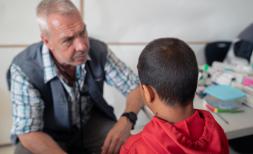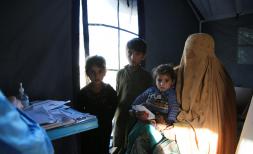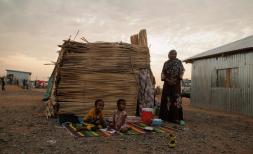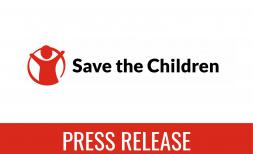SAHEL FOOD CRISIS: FAMILIES STRUGGLING TO FEED AND EDUCATE THEIR CHILDREN IN NIGER AND BURKINA FASO
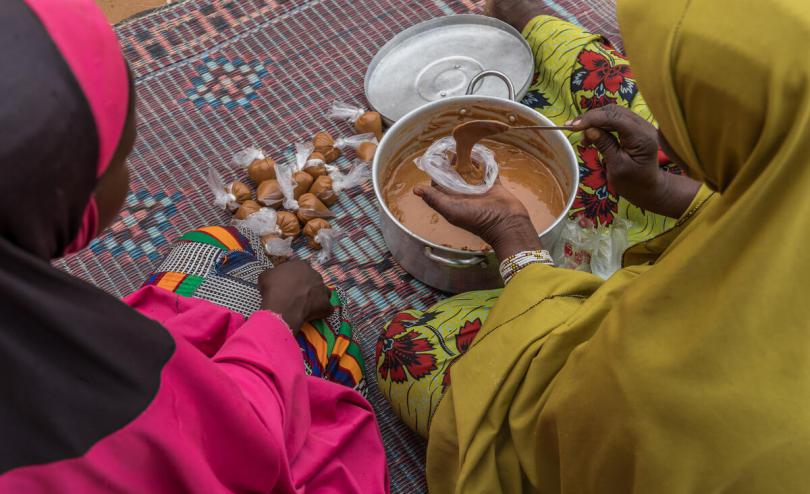
Balkissa*, aged 13, prepares food with her mother Armelle*, aged 54, outside their home in Tillaberi region, Niger. Credit: Apsatou Bagaya/Save the Children
DAKAR, 31 May 2023: A food crisis in the Sahel fuelled by climate crises and conflict is having a devastating impact on children as families cannot afford to buy food and are withdrawing children from school with education no longer seen as a priority, according to a Save the Children report.
The report, ‘The impact of food and nutritional crisis on children in Burkina Faso and Niger’, launched this week, was based on a survey of 630 people in the most hunger-affected areas of Niger and Burkina Faso in West Africa as the world faces its most severe food crisis this century.
Researchers found that 84% of people are eating cheaper and less nutritious foods, and 57% are reducing meal sizes. Worryingly 34% are skipping meals for an entire day, leading to more children suffering from malnutrition.
Food prices have rocketed in Niger and Burkina Faso due to climate shocks such as flooding and drought impacting crops, conflict leading to displacement and an inability to farm, and the war in Ukraine driving up the price of imported foods. About 96% of respondents across both countries reported an increase in food costs.
Djeneba, 18, in Tillaberi in Niger said:
“It is the very poor who suffer the most from the food crisis because, with rising prices, they do not have the means to meet their needs. In very poor households, the meals are simple, with no vegetables, no meat and just a few condiments.”
Souleymane*, a father in Dori, Burkina Faso, added:
“Life has become very hard as food prices have doubled or even tripled in some local markets. Families have become very tired due to rising prices and the unavailability of some basic necessities.”
Concerns over safety as the result of armed violence, and a lack of food are pushing some families to pull their children out of school, reducing their chances of ever returning.
Salimata*, 16, from Dori in Burkina Faso, said:
“Today our parents are more concerned with feeding their children than their schooling. In any case, with the attacks by armed groups, the school has been very affected, it [education] is no longer a priority, we’re experiencing this with the situation of food problems.”
Armed violence has a direct impact on children’s education, particularly in Burkina Faso where 98% respondents described the security situation is bad, very bad and even catastrophic. In Burkina Faso, 84% of respondents mentioned attacks on schools and 82% referenced attacks on teachers.
Some parents have even resorted to more extreme measures, like marrying off their children.
Mohamed*, 22, from Burkina Faso, added:
“Currently, parents are unable to feed their children, and some do not hesitate when they have the opportunity to release a child. It is true that you will see few fathers who will recognise this, but marriage is an opportunity to free your child. In a way, it's one less person to feed."
The Central Sahel is often referred to as the ‘forgotten crisis’ because of its complex and protracted humanitarian crises, which have escalated in recent years. While humanitarian needs are growing, women, girls and children are the hardest hit.
In 2023, an estimated 1.9 million children under five will likely be acutely malnourished in Niger, including 430,000 who are expected to be severely malnourished. In Burkina Faso, an estimated 400,000 children under five will likely suffer from acute malnutrition, with nearly a quarter likely to experience the most severe form of malnutrition.
Despite steps taken by both governments to halt the food crisis, more needs to be done to avert a catastrophe, Save the Children warned.
Vishna Shah, Regional Director of Advocacy and Campaigns for Save the Children, said:
“Conflict and climate change are driving an already dire hunger crisis in one of the world’s most complex regions, to unprecedented levels – jeopardizing the future of millions of children.
“As communities try to cope with rising rates of hunger, rising violence and the negative effects of climate change, families are resorting to extreme measures like pulling their children out of school, as well as child marriage – which robs girls of an opportunity to keep learning, be children, and in many cases, to survive.
“International donors must urgently step up their support for Niger and Burkina Faso to prevent an already catastrophic situation from worsening.”
Save the Children is working across the Sahel to help children and families affected by crises, supporting them with nutritious food, health, education and child protection.
Notes to editors:
*Names changed
The full length report includes results from a survey of 630 people in areas affected by the food and nutrition crisis. In Burkina Faso, data collection took place in the Northern region, Yatenga Province (Ouahigouya and Thiou) and the Sahel region, Séno Province (Dori) and Soum Province (Djibo). As for Niger, data collection took place in the Tillabery region (Anzourou, Sinderet Abala) and the Maradi region (Djiratoua, Safo and Tibiri). Data collection was done over the summer 2022 during the last lean season.
Testimonies were gathered from individual interviews also took place Ouahigouya, Thiou, Dori and Djibo in Burkina Faso, and in Tillabery (Anzourou, Sinderet Abala), Maradi (Djiratawa, Safoet Tibiri) in Niger, as well as during focus group discussions.
Save the Children Burkina Faso
Save the Children has worked in Burkina Faso since 1982. The organisation is currently active in 9 regions (Centre, Centre-Nord, Nord, Sahel, Boucle du Mouhoun, Hauts Bassins, Cascades, Sud-Ouest and Est) and promotes child rights through programmatic and advocacy interventions. Save the Children works in collaboration with the Ministries of Gender and Family, the Ministry of Education (through the Technical Secretariat of EiE), and the Ministries of Health, Agriculture, and Humanitarian
Save the Children Niger
Save the Children has worked in Niger since 2005 providing humanitarian support and long-term development programmes. This work spans child protection, health and nutrition, food security and livelihoods, education, and water, sanitation and hygiene.
For further enquiries please contact:
- Ruby Wright, GMU media manager: ruby.wright@savethechildren.org
- Kunle Olawoyin, Media and Communications Manager: Kunle.Olawoyin@savethechildren.org
- Our media out of hours (BST) contact is media@savethechildren.org.uk / +44(0)7831 650409
Please also check our Twitter account @Save_GlobalNews for news alerts, quotes, statements and location Vlogs.
Ruby Wright l Media Manager
Email: ruby.wright@savethechildren.org
Phone/Whatsapp: +44 (0) 7969983222
Our media out of hours (BST) contact is media@savethechildren.org.uk / +44(0)7831 650409
Twitter: @save_globalnews www.savethechildren.net
